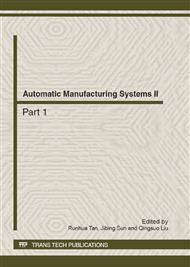p.1434
p.1438
p.1443
p.1447
p.1451
p.1455
p.1459
p.1463
p.1467
Heterogeneous Strategy and its Application in an Improved Micro-Genetic Algorithm
Abstract:
Heterogeneous strategy, population isolation, arithmetic crossover and optimum reserved strategy are used to improve micro-genetic algorithm (mGA) in this paper. Heterogeneous strategy is used to improve the probability of convergence to global optimal solution and quicken up the convergence. Reset frequency is decreased while the global and local searching capabilities of mGA between two resets are enhanced, which makes mGA searching the parameter space intelligently as the mode recognition information is preserved as much as possible. Adaptive random mutation, which used existing genetic information of the current groups, is used to increase efficient search. Finally, standard functions testing demonstrate that the improved mGA can find better optimum solutions with less computing cost than standard genetic algorithm (SGA).
Info:
Periodical:
Pages:
1467-1470
Citation:
Online since:
June 2012
Authors:
Price:
Сopyright:
© 2012 Trans Tech Publications Ltd. All Rights Reserved
Share:
Citation:


